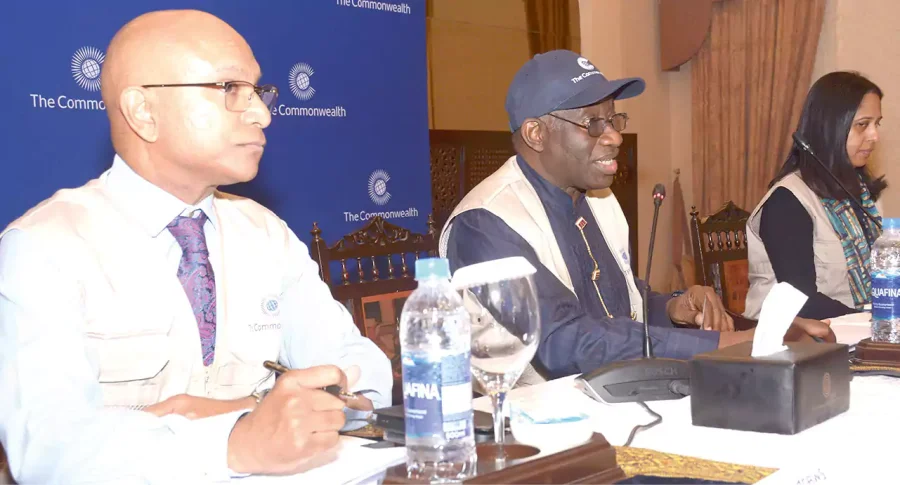Zubair Qureshi Islamabad
In its post-general election preliminary findings, the Commonwealth Observers Group (COG) hailed the election in the country calling it a defining moment for democracy. Elections were held peacefully, says the initial report, however at the same time it admits having received complaints about certain irregularities/anomalies like delay in announcement of results by the ROs, ban on Internet on Election Day and crackdown against a certain political party candidates, etc.
The COG’s head who is former President of Nigeria, Dr Goodluck Jonathan (2010-2015) during a news conference here on Saturday, said his 25-member team chanced to observe the entire election process closely not only in Islamabad but also in Rawalpindi, Lahore, Multan, Karachi, Abbottabad, Hyderabad and Faisalabad. We found an overwhelming number of voters, particularly the young voters casting their vote for the candidates of their choice.
Accompanied by Adviser and Head, Asia at the Commonwealth Secretariat, Dinusha Panditaratne and Head of Electoral Support, Linford Andrews, Dr Jonatahan commended the Pakistan government particularly the Election Commission for making preparations for around 128 million voters to exercise their constitutional right of vote.
At the outset, he made it clear that the mandate of a Commonwealth Observer Group was only to take into consideration factors contributing to, or affecting the credibility of, the electoral process as a whole, and determine whether the elections have been conducted according to the standards for democratic elections to which a member state has committed itself. He told that the COG held meetings with the ECP, the police, political parties, civil society, media representatives, Commonwealth High Commissioners, and citizen observers. He also mentioned security challenges particularly, the attacks in Balochistan a few days before polls resulting in the unfortunate loss of lives. Expressing his sympathies with the relatives of the victims and the injured he commended the polling and security officials for ensuring the safety and security of polling stations in enabling the people of Pakistan to exercise their right to vote.
It is commendable that the national gender gap in registered voters was reduced from almost 13 percent in 2013 to 7.7 percent, he said, noting that 60 seats in the National Assembly are reserved for women. He also referred to the fact that some political parties did not meet the requirement of having at least 5% women candidates on their party lists and that though more than 5,000 candidates stood for election to the National Assembly in these General Elections, the ratio of the women in that number was only 6%. About the election campaign, the COG received reports of incidents of intimidation, violence, arrests and detentions of candidates and supporters especially of a main political party [PTI].
Disallowing a main political party of its election symbol and its impact on the polls result was also highlighted by the COG head. That party’s candidates who later contested polls as independent candidates also conveyed concerns that the affected party would not be eligible for reserved seats, he said. “We note with concern certain media laws and their application, as well as of pressure faced by some members of the media in regard to their coverage of the election, including self-censorship and in regard to their safety. We commend those members of the media who withstood such pressures,” he said. He also noted that the EMS could not operate as intended on Election Day.
We commend all polling staff and security personnel for being proactive in assisting and granting priority to PWDs, the elderly, pregnant and nursing mothers, although we noted that such assistance was not uniform, he said. However, there were some polling stations without ramps and other means of access at many polling stations. On the result management, he said the group noted the continued efforts at promoting transparency, with the display of the signed Form 45 outside each polling station after counting concluded. We note that these forms were due to be sent via the mobile phone application, but the shutdown of internet and mobile coverage compelled presiding officers to rely solely on manual transmission of the forms.










